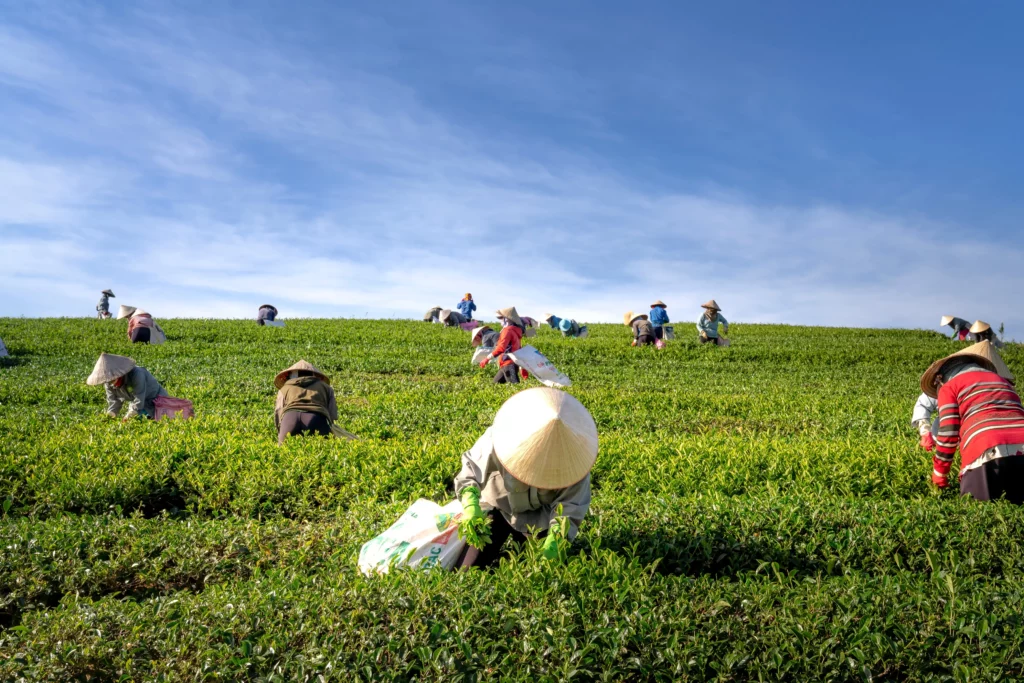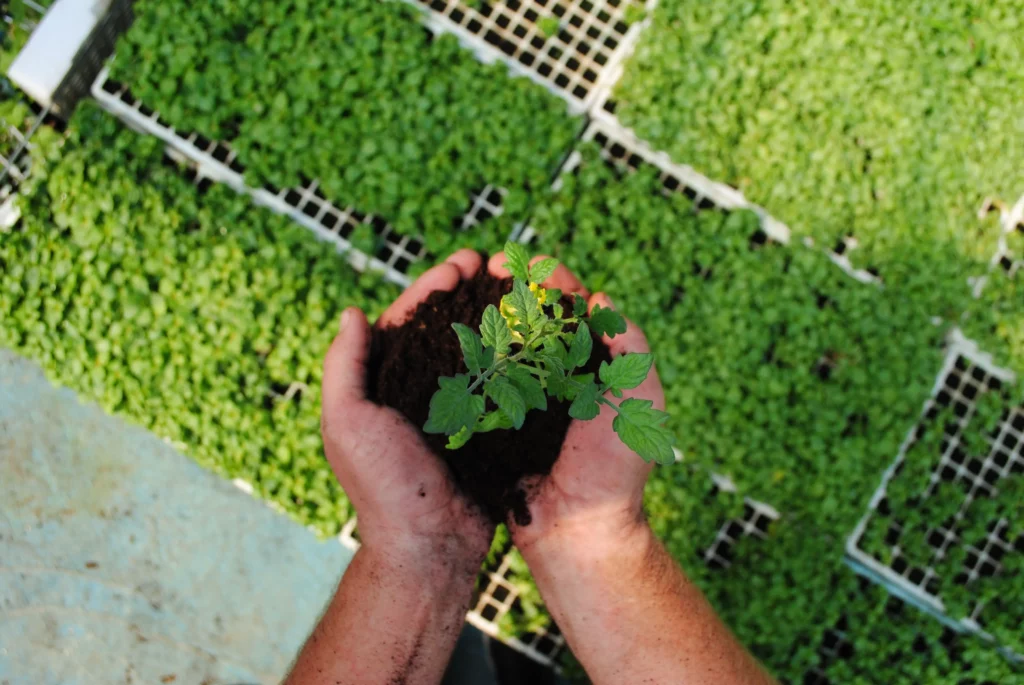As the global community faces the impacts of climate change, farming is perhaps the most affected area. Farming relies on the right mix of environmental factors including temperature and rain, and climate change shakes this balance heavily. Let’s take a look at some of the challenges facing growers and how biostimulants from Brandon Bioscience can help meet those challenges in the long term.
Impacts of Climate Change
A critical step toward mitigating the impact of climate change on agriculture involves acknowledging various causes of climate change. Human activities, such as extensive fossil fuel usage, deforestation, and industrial processes, contribute significantly to global warming by increasing greenhouse gases in the Earth’s atmosphere. Furthermore, agricultural practices themselves—like excessive use of chemical fertilisers, methane emissions from livestock, and the conversion of forests into farmland—also play a substantial role. Recognising these factors is essential for developing strategies to prevent climate change. Striking the right balance between feeding the global community and reducing the impact of agricultural practices is key to a sustainable future.
Altered Weather Patterns and Crop Productivity
Climate change has led to unpredictable weather patterns, creating significant uncertainty in agricultural productivity. Increased incidences of drought, flooding, and severe storms directly impact crop health and yields. The lack of consistency in weather conditions can disrupt planting and harvesting cycles, posing challenges in management and cultivation practices.
Soil Degradation and Water Resource Strain
Enhanced soil erosion, loss of soil organic matter, and decreased fertility are repercussions of extreme weather events and temperature variations. Climate change also imposes a strain on water resources that are indispensable for yield & output.
Biostimulants in Agricultural Practices

Biostimulants in agriculture such as seaweed extracts help improve overall crop vigor, yields, quality, as well as tolerance to abiotic stresses. They facilitate nutrient assimilation, efficiency, and use, optimise metabolic processes, and bolster resistance to environmental pressures. Biostimulants offer growers a tool to face the challenges they are facing through the impact of climate change.
Nutrient Use Efficiency
Modern-day agriculture must deal with several obstacles while continuing to increase its productivity to feed a growing global population. As the climate crisis continues to worsen, agriculture must adapt more sustainable and environmental standard practices. On top of the environmental cost of over-dependence on nutrient inputs, there is also a large financial burden. The use of agricultural lands for crop production requires a constant need for soil nutrients and therefore a constant need for these nutrients to be replenished and maintained. Once fertile lands are being depleted of naturally occurring nutrients which affects their productivity.
Moreover, as the need for more agricultural land is required, producers must attempt to use areas with lower soil nutrients. Strategies to increase soil nutrients rely mainly on the use of fertiliser applications. Fertilisers work incredibly well at increasing nutrients within the environment but overuse and misuse of them cause harm to ecosystems and incur additional costs for the producer.
Nitrogen (N), phosphorus (P), and potassium (K) are the most common nutrients found in fertilisers. Unfortunately, in the case of N, as much as up to 50% of applied chemical N does not make it into the plant. When we talk about nutrient use efficiency (NUE), we must look at it in two situations that interact with one another. The first is the ability (efficiency) of the plant to acquire (absorb) the nutrients found around them. The second is the efficiency of how the plant uses these nutrients once they acquire them which in turn drives plant growth and productivity. Brandon Bioscience’s biostimulants effectively increase and optimise NUE within the plant by successfully targeting both of these situations.
Tolerance To Abiotic Stresses
Agricultural systems exist in an increasingly volatile and erratic environment. Every day crops must deal with a variety of climatic conditions that affect their growth such as temperature, UV radiation, humidity, water availability, salinity, etc. Abiotic stress is defined as the negative impact of non-living factors on living organisms in a specific environment. The stressors that cause abiotic stress are some of the climatic conditions listed and occur when these conditions are not optimal for that crop to effectively grow.
In other words, crops want just the right amount of each, if they are exposed to too much or too little it causes damage which then reduces productivity (yield). Temperature can cause heat stress if it’s too high or cold/frost stress if it’s too low. Another case would be that too much water causes flooding while too little causes drought. As plants are sessile (immobile) they have evolved a vast away of plant defences to help maintain growth during less favourable environmental conditions.
Unfortunately, the climate crisis is worsening abiotic stresses, increasing the risk of crop damage out in the field. Some of the regions around the world with the highest levels of crop productivity and that produce staple crops demanded by the entire world, also happen to be areas affected the most by abiotic stresses and have been forecasted to become less supportive of agriculture in the near future. When applied to the crop prior to and/or during periods of abiotic stress, Brandon Bioscience’s biostimulants help increase and optimise the defences found within the plant at a genetic, biochemical, physiological and phenotypic level making them more tolerant and reducing the damage that might be incurred. Simply put, our solutions make the plant stronger and increase their ability to grow normally even when conditions are sub-optimal.
Crop Quality
Productivity (yield) is a very important parameter when it comes to producers, however, this is followed by the quality of the crop. Crop quality can refer to size, shape, colour, texture, and taste and often governs how much a producer can charge for their produce. Therefore, reductions in crop quality can lead to reductions in the profit a producer can make and also impact how much they can invest back into the next growing season. Quality is of the upmost importance to the consumer as it governs how attractive the product is and also can impact the nutritional value.
Consumers care heavily about the sensory properties but also their health properties as they become more health conscious. Crop quality is the reason behind the numerous market grading systems and price points available. Unfortunately, the climate crisis is not only affecting crop yield but also crop quality affecting both producer’s livelihoods and consumer choices. Specialty crops are of particular concern as their high cost to produce is justified by the profit that they can fetch but only if their quality is maintained.
A classic example of crop quality would be wine grapes which rely on having a particular flavour profile created by their phenolic compounds, pH, water content, maturity, sweetness, etc. Just a slight difference in any of these characteristics and it changes the “mouthfeel” of the subsequent wine and affects how marketable the wine will be to the consumer. Brandon Bioscience’s biostimulants have a long track record of maintaining and improving crop quality in fruits and vegetables. Our customers often remark on an increase in vibrancy (colour), size, weight, sweetness (brix), etc. Moreover, Brandon Bioscience’s solutions make for more uniform harvests, allowing producers to achieve the desired size and shape grades needed for their markets.
Biostimulants for Sustainable Agriculture

Integrating Biostimulants into Climate-Smart Agriculture
The integration of agricultural biostimulants into climate-smart agriculture involves understanding local climate challenges, soil characteristics, and crop requirements. Customised solutions that consider these variables can significantly improve crop yields, safeguard ecosystems, and contribute to food security under changing climatic conditions.
Regulatory Frameworks and Future Research for Biostimulants
For the potential of biostimulants to be fully realised, appropriate regulatory frameworks need to be established across the globe to ensure successful integration into agricultural systems. The implementation of the EU Fertilising Products Regulation (FPR) 2019/1009 is a key step in further marking biostimulants place in a more sustainable agricultural future. Additionally, continuous biostimulant research is important to continuously improve and innovate formulations and application methods that are cost-effective, environmentally friendly, and tailored to address the ever-evolving challenges of climate change.
Strengthening Community Resilience with Biostimulants
Adopting biostimulants is not just about adapting to climate change; it’s also about ensuring food security and community resilience. Educating agricultural communities on the benefits and application of biostimulants, combined with other sustainable practices, is essential. Their role in maintaining crop diversity, improving yields, and ensuring consistent food supply chains is invaluable, especially in vulnerable regions.
Conclusion

The adverse effects of climate change on agriculture are undeniable and multifaceted, threatening global food security and economic stability. Biostimulants provide a tool for growers to meet these challenges. They can transform the agricultural landscape by bolstering plant health, improving resistance to environmental stresses, and enhancing overall sustainability.
Companies like Brandon Bioscience are at the forefront of this biostimulants revolution. With their commitment to innovative biostimulant research and development, they are paving the way for new solutions that address the core challenges of modern agriculture. With a rich legacy of 26 years in the industry, Brandon Bioscience’s global presence in over 44 countries demonstrates their unwavering commitment to pioneering innovative biostimulant products in agriculture. Unlocking the full potential of biostimulants necessitates concerted efforts in research, policymaking, and grassroots implementation. By embracing plant biostimulants products and supporting pioneering work like Brandon Bioscience, the global agricultural sector can forge a path to a more resilient and sustainable future, securing food supplies and protecting our ecosystems in the face of climate adversity.

